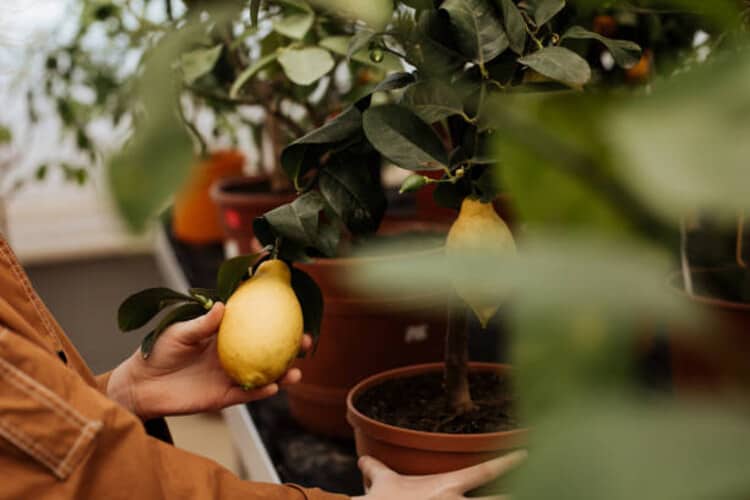Sign up for our newsletter
Get Swipe Garden's independent reviews, and expert advice sent straight to your inbox.
For information privacy practices, read our Privacy Policy.
Sign up for our newsletter
Get Swipe Garden's independent reviews, and expert advice sent straight to your inbox.
For information privacy practices, read our Privacy Policy.
Sign up for our newsletter
Get Swipe Garden's independent reviews, and expert advice sent straight to your inbox.
For information privacy practices, please read our Privacy Policy.

Fertilizing helps ensure the stable and healthy development of your houseplant. However, not all gardeners provide their crops with what they want. So, how do you fertilize a potted lemon tree?
There are three options for fertilizing a citrus houseplant: liquid, dry, and spike. Each approach comes with a different fertilizing method. The fertilizer you choose also affects the way you feed your plant.
Today, I will give you in-depth instructions about how to take care of your plant. Let’s continue reading to find out!
To fertilize a potted citrus tree, you can use liquid, dry, or spiked fertilizers. The best method depends on the size, region, and environmental factors of the plant.
Learn how to grow your own lemons at home with this guide video.
Liquid fertilizer is easy to obtain and is available in various quantities to suit different needs.
To apply the liquid fertilizer, follow these steps:
Dry fertilizer releases its nutrients slowly over time, providing a continuous supply of nutrients to the plant.
The process of using dry fertilizer is relatively simple:
Spikes are pre-measured and provide a convenient way to fertilize, but it is still important to follow the instructions and not over-fertilize. This option appears to be the easiest to apply to your plant. You need to insert the spike containers into the soil for a determined period of time.
Remember to refer to the instructions on the package for the precise quantity and attachment method.
Essential citrus fertilizer has a balanced blend of all the nutrients a lemon tree requires. It is an excellent choice for boosting your lemon tree’s growth and fruit production.
The quantity of fertilizer depends on the size and age of your tree. In general, we focus more on age, using the following recommendations:
It is advisable to fertilize your plants when they are actively growing. For citrus plants, the ideal time is spring and summer. When the summer ends or your tree’s natural yield starts to slow down, cease fertilizing.
During the winter, don’t fertilize your tree.
The fertilizer label will provide you with detailed guidelines for the appropriate feeding schedule. Nevertheless, there are some rules to follow:
Lemon trees, citrus trees, and fruit trees need high nutrient content to thrive. Most of those nutrients come from fertilizers. If the tree cannot support the fruit, it will drop prematurely. Using organic fertilizer and potting soil on the tree if it has outgrown its container may assist.
When buying citrus fertilizer, you need to seek the following nutrients:
Lemon or lime trees aren’t very different from other plants with the proper soil and pot, excluding the aromatic flowers and fruit. Give your plants these basic requirements, and you’ll get the value:
Your plant needs about six to eight hours of strong light. It’s an excellent idea to grow citrus trees and lemon trees near windows that face southwest or south. Remember that natural sunlight changes with the seasons, so make adjustments as needed. Grow lights will help you make up for the lack of natural daylight.
Pruning plants regularly helps to keep their development under control and encourages larger, healthier fruit. Pruning fruit trees such as lemon trees, apple trees, and orange trees should be done once a year after the coldest season.
Citrus thrives at average home temperatures. Most can endure a short frost. However, you need to keep your citrus trees away from breezes as well as heating and cooling pipes. Containers of citrus may spend the summer outside, but you have to keep them indoors until the risk of frost has passed in the spring.
To avoid overheating the tree trunk, make sure the plastic tube is white or lighter in colour. Then transfer them slowly over several weeks to allow them to adapt. Otherwise, they may lose their growing fruit.
Your citrus plant needs watering twice per week. It would help if you kept this schedule until the new growth started. After that, the plant likes to dry out between waterings. So, you should deep-water your plant once every ten days.
Planting a lemon tree in a pot gives you complete control over your crop. It would be perfect for feeding your plant at the right time with the correct quantity of fertilizer in the right way. Thanks to proper care, the plant will grow at its best.
Hopefully, you will find this article helpful. If you need any further information, please feel free to ask. Thank you for reading!